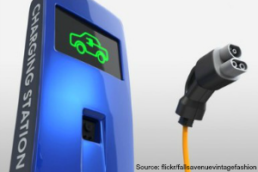Press release on EPBD
3rd July 2017NewsPress Release
Platform for Electro-Mobility reaction to Council position on EPBD
EU ministers have agreed on a common approach to the revision of the Energy Performance of Buildings Directive (EPBD). The European Commission’s legislative proposal for the EPBD introduced obligations for EU countries to ensure adequate and future-proof pre-equipping of buildings for electric vehicle (EV) recharging points.
These obligations have, however, encountered strong resistance from EU Member States due to concerns over costs and potential negative impacts on renovation incentives, and have as a result been watered down. While this lowered level of ambition is regrettable, core elements remain in place and it will now be up to the European Parliament to strengthen these as it gets closer to finalising its own position.
A spokesperson for the Platform for Electro-Mobility said: “Pre-equipping buildings for the installation of smart EV charging points is crucial to satisfy EV charging needs and foster the wider uptake of electro-mobility. In fact, 90% of the electricity charged by an EV during its lifetime actually takes place in the private domain.”
The ability of charging infrastructure to control the charging process is crucial for integrating high numbers of EVs into the electricity system and contributes to optimising the energy use of buildings. Therefore, the directive should require the installation of smart charging points, which should be considered part of the building's technical equipment and included in the ‘smartness indicator’.
When it comes to non-residential buildings, the Council compromise text retains the obligation for new and substantially renovated buildings with more than 10 parking spaces to install at least one recharging point, together with ducting infrastructure [1] for at least one in every three parking spaces.
Ducting infrastructure is a future-proof and cost-effective solution, the installation cost of which is minimal as compared to the total cost of constructing or renovating a building. By comparison, failure to ensure ducting infrastructure would entail costs up to nine times higher if a building is to be retrofitted at a later stage. In light of this, the Platform for Electro-Mobility supports an extension of ducting infrastructure requirements to all parking spaces, which has already been taken on board by Council in the case of residential buildings.
On a more positive note, the Platform acknowledges the Council’s insertion of obligations to facilitate deployment of recharging points in existing buildings. Today, long and uncertain approval procedures act as a major barrier for owners and tenants to deploy charging points in shared residential and commercial buildings. If these hurdles are not removed, putting in place ducting infrastructure cannot have its full positive impact. Such ‘right to the plug’ measures have already been successfully implemented in various EU countries including Spain, France, and Portugal.
The spokesperson concluded: “All eyes now turn to the European Parliament, which is set to agree its final position in November before entering negotiations with governments and the European Commission. Strengthening this directive offers a once-in-a-decade opportunity to ensure European buildings’ readiness for the mobility needs of tomorrow.”
The Platform for Electro-Mobility is an alliance of organisations from across industries and transport modes representing manufacturers, infrastructure managers, operators and users of all types of vehicles as well as cities, civil society and other stakeholders. It shares a vision of electro-mobility for surface transport delivered through multiple modes including electric bikes, cars and vans, trucks, buses, rail and other public transport. The Platform has been created to drive forward this transformation.
Note to editors:
[1] Also referred to as ‘pre-tubing’ or ‘conduits’ to enable the later installation of EV recharging points.
Event - 28 March - EU Parliament
Electrifying transport in Europe has the potential to increase all Europeans’ access to cheaper and more reliable mobility. Electro-mobility also forms a central component of the EU’s drive to decarbonize its whole economy in line with the Paris Agreement.
In the context of the European Commission’s “Clean Energy for all Europeans” package, the Platform for Electro-mobility is organizing this event to discuss how we can accelerate the transition to electro-mobility. How do we roll out more charging infrastructure? How do we overcome regulatory bottlenecks at EU and national level? What is the right role of alternative fuels in moving us towards full electro-mobility?
The Platform is grateful to Ismail Ertug MEP for hosting our event in the European Parliament. Each of the Platform’s 25 members will be sending expert representatives and we will also be hearing from the deputy head of Vice-President Maroš Šefčovič cabinet, as well as Member State transport attaches and NGOs.
The full programme is below.
Join us and add your voice to the debate.
[su_service title="When?" icon="icon: calendar" size="20"]Tuesday, March 28, 2017 - 17:30 to 20:00[/su_service]
[su_service title="Where?" icon="icon: map-marker" size="20"]European Parliament / Room P3C050 / 1000 Brussels / Belgium[/su_service]
Programme:
17:30 - Registration
18:00 - Start of the event
Welcome speech by Ismail Ertug (S&D), Member of the European Parliament, Member of the TRAN and EMIS Committees.
Introduction: Platform presentation by Chairman – Nicolas Erb, EU Director Alstom
Keynote speaker: Christian Linder, member of the Šefčovič Cabinet
Panel Discussion moderated by Greg Archer, Director Clean Vehicles, T&E
- European Commission Representative: Peter Handley, Secretary General, European Commission
- EU Member State Representative: Dr. Klaus Bonhoff, Managing Director German agency NOW
- NGO representative: Frederic Hauge, Founder and President of Bellona
- Utilities representative: Tina Zierul, E-Mobility Program Manager at EON Technologies
- Transport representative: Umberto Guida, Director Research & Innovation, UITP
19:30-20:00 - Networking session
[maxbutton id="2" url="https://docs.google.com/a/transportenvironment.org/forms/d/e/1FAIpQLSfo34VJVYrewZ4dQMJPAtRbWgtyZ_2UMWzIIMgrmM4HHAuF-A/viewform" ]
Deadline to register for the event: March 23 (request from the European Parliament security services)
Commission shift to electrified transport on the right track
Commission shift to electrified transport on the right track
says Platform for Electro-Mobility
The Platform for Electro-mobility welcomes the Commission’s Strategy for Low Emission Mobility in driving the shift to clean, low carbon transport powered by electricity. Integrating all type of emissions is one key element of the uptake of electric vehicles, especially in cities and urban areas, allowing local and regional authorities to better comply with other European standards beyond CO2 emissions.
In its representations to the Commission, the Platform highlighted that electro-mobility provides a huge opportunity for innovation and job creation and allows Europe to reduce its dependency on imported oil. 94% on energy use in transport is oil and the shift away from this is recognised in the Strategy with one of the three pillars focused on “Low-emission alternative energy for transport.” This transformation can create over a million additional jobs and reduce the millions of euros of costs of transport-related air pollution emissions.
Platform Chair Senan McGrath said, “The Strategy recognises the pivotal potential for electro-mobility in the EU’s low emissions transport strategy. Now we need this translated into concrete actions to end road transport’s addiction to oil and encourage the shift to low emissions electric multimodality. In doing so there is a unique opportunity for European business to be at the forefront of delivering clean, green and energy efficient mobility. We look forward to working with the Commission in developing these proposals.”
Key announcements welcomed by the Platform include recognition that to achieve widespread adoption of electric vehicles, charging infrastructure needs to become widely available throughout Europe and that financing opportunities through the European Fund for Strategic Investments will be further exploited to achieve this. The Platform also welcomes the emphasis upon open cross border and EU-wide electro-mobility services market for consumers including providing real-time information on public charging points and supporting interoperable payment systems. The need to facilitate integration of electric vehicles with smart grids based on innovative technologies and advanced market rules will be key to further accelerate overall adoption of electro-mobility and must be a feature of the forthcoming Energy Market Reform.
The Platform was also pleased that the Strategy recognises that “transformational change towards low- and zero-emission vehicles will need to be supported by a wide range of measures at all levels of policy-making to engage both manufacturers and users.” Also, that it recognises the importance of electric rail services for both passengers and freight.
However, the Platform is disappointed that the Strategy has a limited focus on ways to reduce emissions in urban environments, including through the use of light electric vehicles such as scooters and e-bikes, and the lack of concrete measures proposed in this crucial area of action.
Senan McGrath concluded, “The shift to electro-mobility requires action at the EU, national and local level and by the public and private sectors working in their common interests. The Commission has signaled it is persuaded and the members of the Platform are working to make this a growing reality. Now we need all EU Member States to embrace the agenda with the common commitment to enable clean electricity to become the dominant energy source for transport both within and between cities.”
Note to editors:
The Platform for Electro-Mobility (www.platformelectromobility.eu) is a European alliance of over 20 producers, infrastructure managers, operators, transport users, cities and civil society organizations from across industries and transport modes. The Platform advocates the acceleration of electrification of all modes of transport, focusing on its numerous benefits, such as emission reduction, efficiency gains, support for technological innovation, jobs and growth through value creation in Europe as well as reducing Europe’s energy dependence from fossil fuel imports. The vision of the Platform for Electro-mobility is a sustainable, multimodal transport system in which people and goods are predominantly moved across land in Europe using sustainable electricity.”




